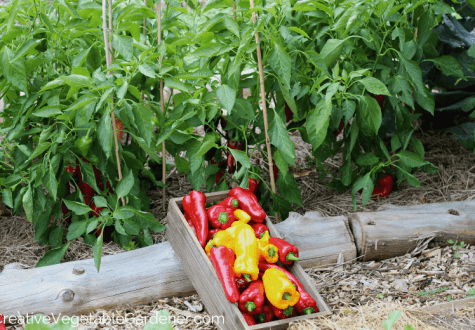Best Fertilizers for Peppers: Attain Superior Results in Your Yard
Best Fertilizers for Peppers: Attain Superior Results in Your Yard
Blog Article
Organic Vs. Synthetic Fertilizers: Which Is Best for Supporting Healthy Pepper Plants?
In the world of nurturing healthy and balanced pepper plants, the selection in between artificial and natural fertilizers stands as an essential choice with far-ranging effects. While both options aim to provide necessary nutrients to support plant growth, the subtleties of their influence on the soil, plant wellness, and the setting spark an argument that echoes throughout the horticulture community. Understanding the unique benefits and potential pitfalls of each fertilizer kind is vital for pepper cultivators seeking to enhance their yields while keeping an eco-conscious and sustainable technique.
Benefits of Organic Plant Foods
Organic fertilizers use a lasting and environmentally-friendly method to beneficial pepper plants, providing essential nutrients without making use of artificial chemicals. These all-natural plant foods are obtained from organic resources such as compost, manure, bone meal, and seaweed, advertising dirt health and biodiversity. Unlike artificial fertilizers, natural choices launch nutrients gradually, ensuring a well balanced and stable supply for pepper plants to flourish.
One significant benefit of natural fertilizers is their capacity to enhance soil framework and water retention. By boosting soil health, organic fertilizers advertise useful microbial activity, which assists in nutrient uptake by pepper plants. Additionally, natural plant foods decrease the risk of chemical run-off, securing water sources from air pollution and securing the atmosphere.
Furthermore, organic fertilizers contribute to long-lasting dirt fertility by promoting the growth of beneficial soil organisms. These organisms aid damage down organic issue, releasing nutrients in a type that is easily accessible to pepper plants. best fertilizers for peppers. By promoting a healthy and balanced soil ecological community, organic fertilizers support sustainable pepper farming techniques that benefit both plants and the environment
Downsides of Artificial Fertilizers
Artificial plant foods, unlike their organic counterparts, posture numerous downsides when used to nourish pepper plants, affecting both plant health and ecological sustainability. One significant downside of artificial fertilizers is their tendency to leach nutrients from the soil rapidly. This fast leaching can bring about vitamins and mineral imbalances in the dirt, creating plants to experience shortages or poisonings. In addition, synthetic fertilizers can hurt helpful dirt microorganisms, such as earthworms and helpful microorganisms, interrupting the dirt community's balance.
Furthermore, the overuse of synthetic plant foods can add to water pollution. Excess plant foods not absorbed by plants can clean away into water bodies, bring about eutrophication, where algae blossoms diminish oxygen degrees in the water, harming water life. Furthermore, synthetic plant foods are commonly originated from non-renewable sources, such as fossil gas, adding to carbon exhausts and environmental destruction throughout their manufacturing.
Nutrient Absorption Contrast
When comparing organic and synthetic plant foods in terms of nutrient absorption, natural fertilizers have the advantage of offering a more balanced and slow-release source of nutrients. Organic plant foods contain a range of macro and micronutrients that are not only useful for the plants but also promote healthy and balanced soil microbial task, which aids in nutrient uptake.
Furthermore, organic fertilizers boost soil framework and Get More Info water retention capacity, enabling pepper plants to gain access to nutrients more effectively. This better dirt quality helps with root advancement, making it possible for far better nutrient absorption. Artificial fertilizers, although initially increasing plant development due to their high nutrient focus, might prevent long-lasting nutrient absorption by derogatory soil health and wellness in time.
Environmental Impact Factors To Consider

On the various other hand, synthetic plant foods, although often more promptly readily available and concentrated to plants, can have destructive effects on the setting otherwise applied effectively (best fertilizers for peppers). Their manufacturing needs high power inputs, causing greenhouse gas emissions and adding to climate adjustment. The overflow of excess synthetic fertilizers can sites infect water resources, leading to eutrophication and damaging aquatic ecological communities.
Finest Plant Food Practices for Peppers
When feeding pepper plants, optimizing nutrient uptake and decreasing ecological impact are crucial considerations. To achieve this, it is necessary to follow finest fertilizer techniques customized to the details needs of pepper plants. One critical technique is to carry out a soil test before using any type of fertilizers. This test can figure out the pH level of the dirt and determine any kind of nutrient deficiencies, leading you in choosing one of the most suitable fertilizer formulation.
Another important technique is to fertilize pepper plants at the best time. Commonly, peppers profit from obtaining fertilizer at planting and afterwards once more when they start to flower. Over-fertilizing can cause vitamins and mineral inequalities and damage the plants, so it is important to comply with advised application rates.
Furthermore, selecting a well balanced plant food with an NPK proportion that suits pepper plants' needs is essential. Eventually, integrating synthetic and organic plant foods judiciously can assist nurture healthy pepper plants while reducing ecological impact.
Conclusion

Organic fertilizers offer an weblink environmentally-friendly and sustainable method to beneficial pepper plants, providing crucial nutrients without the usage of artificial chemicals. Unlike synthetic plant foods, natural alternatives launch nutrients slowly, making sure a steady and well balanced supply for pepper plants to prosper.
Synthetic plant foods, in contrast to their natural counterparts, present various downsides when used to nourish pepper plants, impacting both plant health and wellness and environmental sustainability. When contrasting artificial and natural fertilizers in terms of nutrient absorption, organic fertilizers have the advantage of offering a much more well balanced and slow-release source of nutrients.Furthermore, organic fertilizers boost soil structure and water retention capability, enabling pepper plants to gain access to nutrients a lot more effectively.
Report this page